Positive Leadership: Authentic Leadership, LMX, and PsyCap Essay
VerifiedAdded on 2023/05/30
|13
|2779
|70
Essay
AI Summary
This essay delves into the multifaceted aspects of positive leadership, focusing on the interrelationships between authentic leadership, Leader-Member Exchange (LMX), and employees' psychological capital (PsyCap). The essay begins with an introduction that highlights the significance of these elements in fostering a positive and productive work environment. It then provides a comprehensive literature review, examining how authentic leadership cultivates trust and encourages employee contributions, while LMX enhances the leader-follower relationship. Furthermore, the essay explores the impact of PsyCap, comprising resilience, hope, optimism, and self-efficacy, on various employee outcomes. The analysis extends to how organizations can build PsyCap among diverse employee groups, such as white-collar and blue-collar workers, through psychological capital training interventions and authentic leadership development. The essay also discusses the significant role of emotions in the workplace, including how they influence employee performance, decision-making, and interpersonal relationships. The conclusion summarizes the key findings, emphasizing the importance of positive leadership in enhancing employee productivity and organizational success, and highlighting the value of considering employee emotions in leadership strategies.

Positive Leadership
Paraphrase This Document
Need a fresh take? Get an instant paraphrase of this document with our AI Paraphraser
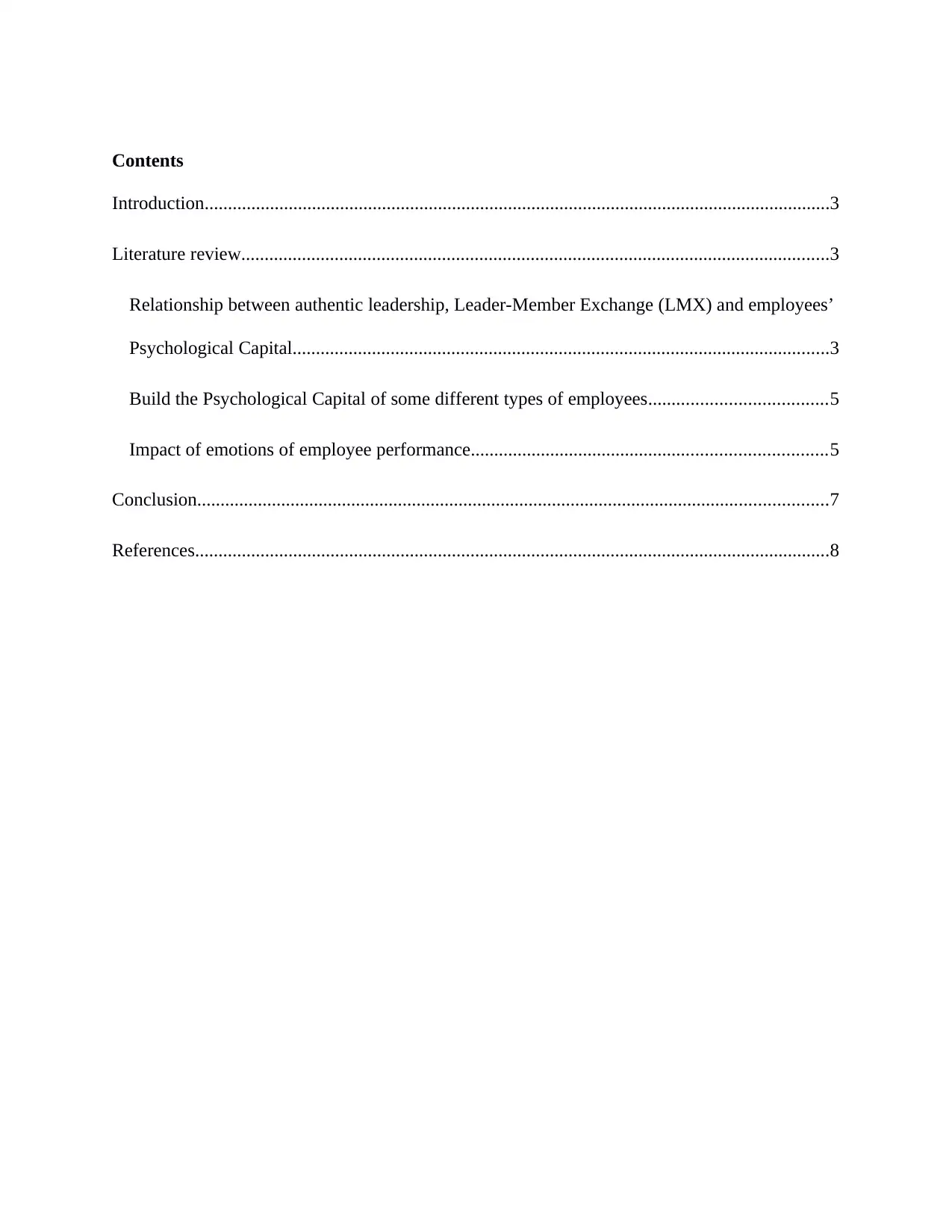
Contents
Introduction......................................................................................................................................3
Literature review..............................................................................................................................3
Relationship between authentic leadership, Leader-Member Exchange (LMX) and employees’
Psychological Capital...................................................................................................................3
Build the Psychological Capital of some different types of employees......................................5
Impact of emotions of employee performance............................................................................5
Conclusion.......................................................................................................................................7
References........................................................................................................................................8
Introduction......................................................................................................................................3
Literature review..............................................................................................................................3
Relationship between authentic leadership, Leader-Member Exchange (LMX) and employees’
Psychological Capital...................................................................................................................3
Build the Psychological Capital of some different types of employees......................................5
Impact of emotions of employee performance............................................................................5
Conclusion.......................................................................................................................................7
References........................................................................................................................................8
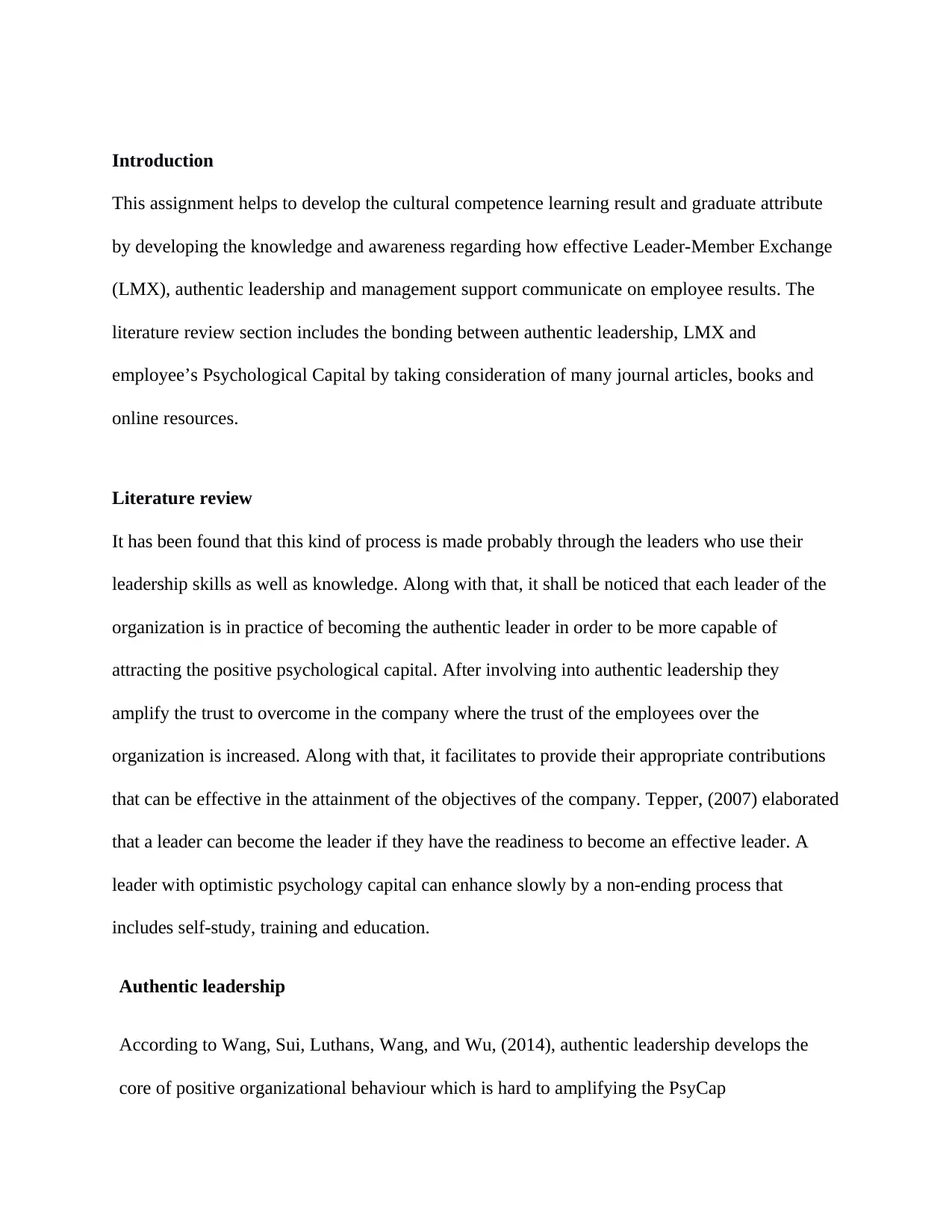
Introduction
This assignment helps to develop the cultural competence learning result and graduate attribute
by developing the knowledge and awareness regarding how effective Leader-Member Exchange
(LMX), authentic leadership and management support communicate on employee results. The
literature review section includes the bonding between authentic leadership, LMX and
employee’s Psychological Capital by taking consideration of many journal articles, books and
online resources.
Literature review
It has been found that this kind of process is made probably through the leaders who use their
leadership skills as well as knowledge. Along with that, it shall be noticed that each leader of the
organization is in practice of becoming the authentic leader in order to be more capable of
attracting the positive psychological capital. After involving into authentic leadership they
amplify the trust to overcome in the company where the trust of the employees over the
organization is increased. Along with that, it facilitates to provide their appropriate contributions
that can be effective in the attainment of the objectives of the company. Tepper, (2007) elaborated
that a leader can become the leader if they have the readiness to become an effective leader. A
leader with optimistic psychology capital can enhance slowly by a non-ending process that
includes self-study, training and education.
Authentic leadership
According to Wang, Sui, Luthans, Wang, and Wu, (2014), authentic leadership develops the
core of positive organizational behaviour which is hard to amplifying the PsyCap
This assignment helps to develop the cultural competence learning result and graduate attribute
by developing the knowledge and awareness regarding how effective Leader-Member Exchange
(LMX), authentic leadership and management support communicate on employee results. The
literature review section includes the bonding between authentic leadership, LMX and
employee’s Psychological Capital by taking consideration of many journal articles, books and
online resources.
Literature review
It has been found that this kind of process is made probably through the leaders who use their
leadership skills as well as knowledge. Along with that, it shall be noticed that each leader of the
organization is in practice of becoming the authentic leader in order to be more capable of
attracting the positive psychological capital. After involving into authentic leadership they
amplify the trust to overcome in the company where the trust of the employees over the
organization is increased. Along with that, it facilitates to provide their appropriate contributions
that can be effective in the attainment of the objectives of the company. Tepper, (2007) elaborated
that a leader can become the leader if they have the readiness to become an effective leader. A
leader with optimistic psychology capital can enhance slowly by a non-ending process that
includes self-study, training and education.
Authentic leadership
According to Wang, Sui, Luthans, Wang, and Wu, (2014), authentic leadership develops the
core of positive organizational behaviour which is hard to amplifying the PsyCap
⊘ This is a preview!⊘
Do you want full access?
Subscribe today to unlock all pages.

Trusted by 1+ million students worldwide
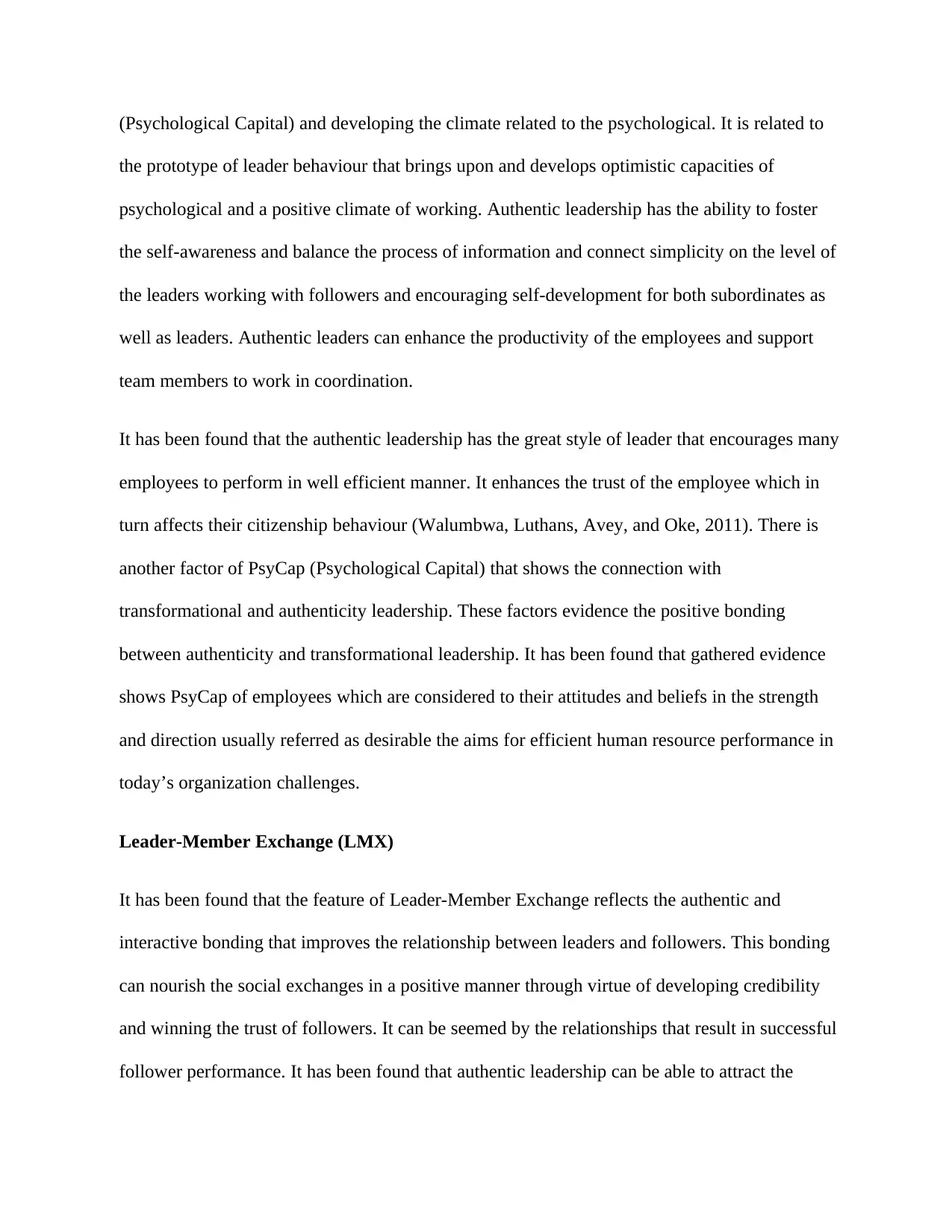
(Psychological Capital) and developing the climate related to the psychological. It is related to
the prototype of leader behaviour that brings upon and develops optimistic capacities of
psychological and a positive climate of working. Authentic leadership has the ability to foster
the self-awareness and balance the process of information and connect simplicity on the level of
the leaders working with followers and encouraging self-development for both subordinates as
well as leaders. Authentic leaders can enhance the productivity of the employees and support
team members to work in coordination.
It has been found that the authentic leadership has the great style of leader that encourages many
employees to perform in well efficient manner. It enhances the trust of the employee which in
turn affects their citizenship behaviour (Walumbwa, Luthans, Avey, and Oke, 2011). There is
another factor of PsyCap (Psychological Capital) that shows the connection with
transformational and authenticity leadership. These factors evidence the positive bonding
between authenticity and transformational leadership. It has been found that gathered evidence
shows PsyCap of employees which are considered to their attitudes and beliefs in the strength
and direction usually referred as desirable the aims for efficient human resource performance in
today’s organization challenges.
Leader-Member Exchange (LMX)
It has been found that the feature of Leader-Member Exchange reflects the authentic and
interactive bonding that improves the relationship between leaders and followers. This bonding
can nourish the social exchanges in a positive manner through virtue of developing credibility
and winning the trust of followers. It can be seemed by the relationships that result in successful
follower performance. It has been found that authentic leadership can be able to attract the
the prototype of leader behaviour that brings upon and develops optimistic capacities of
psychological and a positive climate of working. Authentic leadership has the ability to foster
the self-awareness and balance the process of information and connect simplicity on the level of
the leaders working with followers and encouraging self-development for both subordinates as
well as leaders. Authentic leaders can enhance the productivity of the employees and support
team members to work in coordination.
It has been found that the authentic leadership has the great style of leader that encourages many
employees to perform in well efficient manner. It enhances the trust of the employee which in
turn affects their citizenship behaviour (Walumbwa, Luthans, Avey, and Oke, 2011). There is
another factor of PsyCap (Psychological Capital) that shows the connection with
transformational and authenticity leadership. These factors evidence the positive bonding
between authenticity and transformational leadership. It has been found that gathered evidence
shows PsyCap of employees which are considered to their attitudes and beliefs in the strength
and direction usually referred as desirable the aims for efficient human resource performance in
today’s organization challenges.
Leader-Member Exchange (LMX)
It has been found that the feature of Leader-Member Exchange reflects the authentic and
interactive bonding that improves the relationship between leaders and followers. This bonding
can nourish the social exchanges in a positive manner through virtue of developing credibility
and winning the trust of followers. It can be seemed by the relationships that result in successful
follower performance. It has been found that authentic leadership can be able to attract the
Paraphrase This Document
Need a fresh take? Get an instant paraphrase of this document with our AI Paraphraser
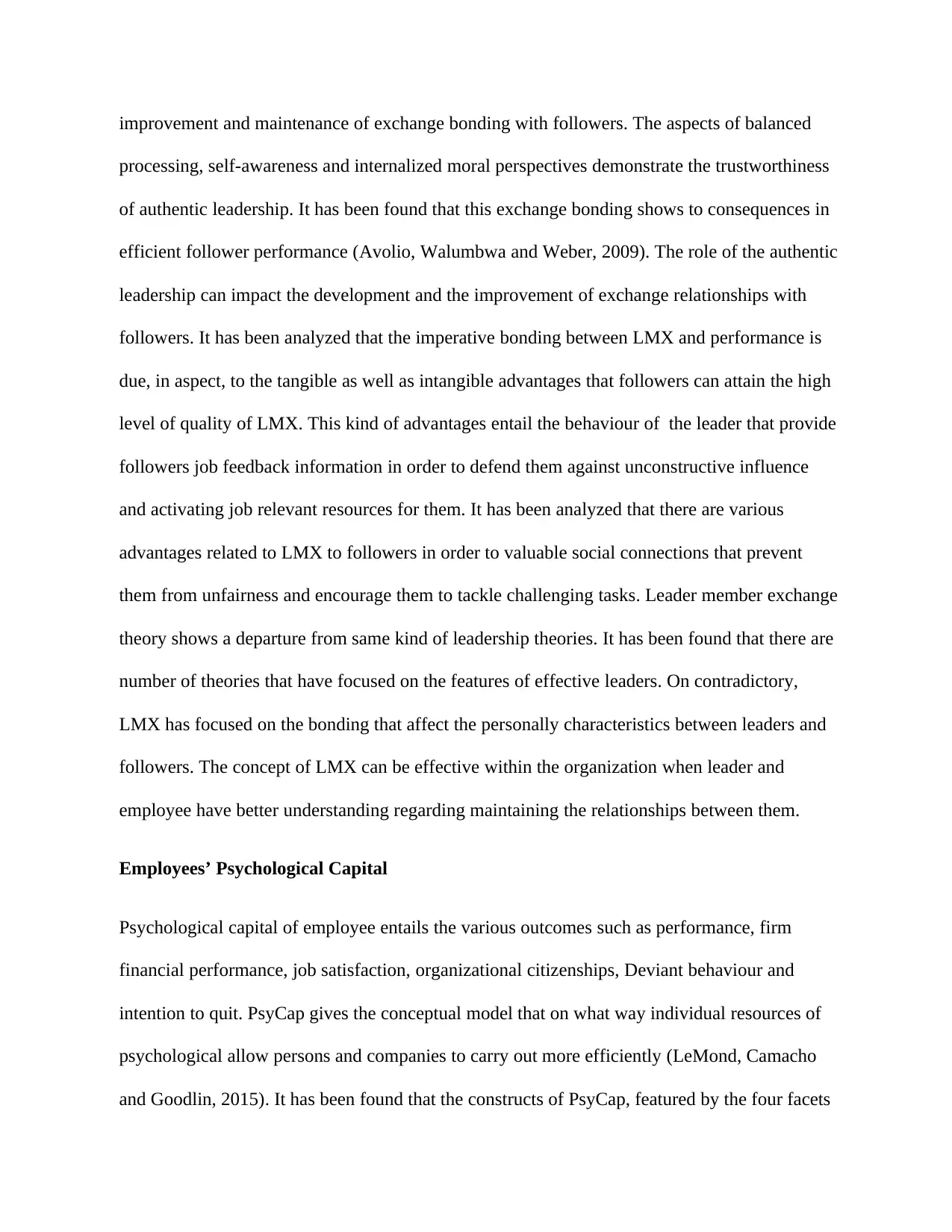
improvement and maintenance of exchange bonding with followers. The aspects of balanced
processing, self-awareness and internalized moral perspectives demonstrate the trustworthiness
of authentic leadership. It has been found that this exchange bonding shows to consequences in
efficient follower performance (Avolio, Walumbwa and Weber, 2009). The role of the authentic
leadership can impact the development and the improvement of exchange relationships with
followers. It has been analyzed that the imperative bonding between LMX and performance is
due, in aspect, to the tangible as well as intangible advantages that followers can attain the high
level of quality of LMX. This kind of advantages entail the behaviour of the leader that provide
followers job feedback information in order to defend them against unconstructive influence
and activating job relevant resources for them. It has been analyzed that there are various
advantages related to LMX to followers in order to valuable social connections that prevent
them from unfairness and encourage them to tackle challenging tasks. Leader member exchange
theory shows a departure from same kind of leadership theories. It has been found that there are
number of theories that have focused on the features of effective leaders. On contradictory,
LMX has focused on the bonding that affect the personally characteristics between leaders and
followers. The concept of LMX can be effective within the organization when leader and
employee have better understanding regarding maintaining the relationships between them.
Employees’ Psychological Capital
Psychological capital of employee entails the various outcomes such as performance, firm
financial performance, job satisfaction, organizational citizenships, Deviant behaviour and
intention to quit. PsyCap gives the conceptual model that on what way individual resources of
psychological allow persons and companies to carry out more efficiently (LeMond, Camacho
and Goodlin, 2015). It has been found that the constructs of PsyCap, featured by the four facets
processing, self-awareness and internalized moral perspectives demonstrate the trustworthiness
of authentic leadership. It has been found that this exchange bonding shows to consequences in
efficient follower performance (Avolio, Walumbwa and Weber, 2009). The role of the authentic
leadership can impact the development and the improvement of exchange relationships with
followers. It has been analyzed that the imperative bonding between LMX and performance is
due, in aspect, to the tangible as well as intangible advantages that followers can attain the high
level of quality of LMX. This kind of advantages entail the behaviour of the leader that provide
followers job feedback information in order to defend them against unconstructive influence
and activating job relevant resources for them. It has been analyzed that there are various
advantages related to LMX to followers in order to valuable social connections that prevent
them from unfairness and encourage them to tackle challenging tasks. Leader member exchange
theory shows a departure from same kind of leadership theories. It has been found that there are
number of theories that have focused on the features of effective leaders. On contradictory,
LMX has focused on the bonding that affect the personally characteristics between leaders and
followers. The concept of LMX can be effective within the organization when leader and
employee have better understanding regarding maintaining the relationships between them.
Employees’ Psychological Capital
Psychological capital of employee entails the various outcomes such as performance, firm
financial performance, job satisfaction, organizational citizenships, Deviant behaviour and
intention to quit. PsyCap gives the conceptual model that on what way individual resources of
psychological allow persons and companies to carry out more efficiently (LeMond, Camacho
and Goodlin, 2015). It has been found that the constructs of PsyCap, featured by the four facets
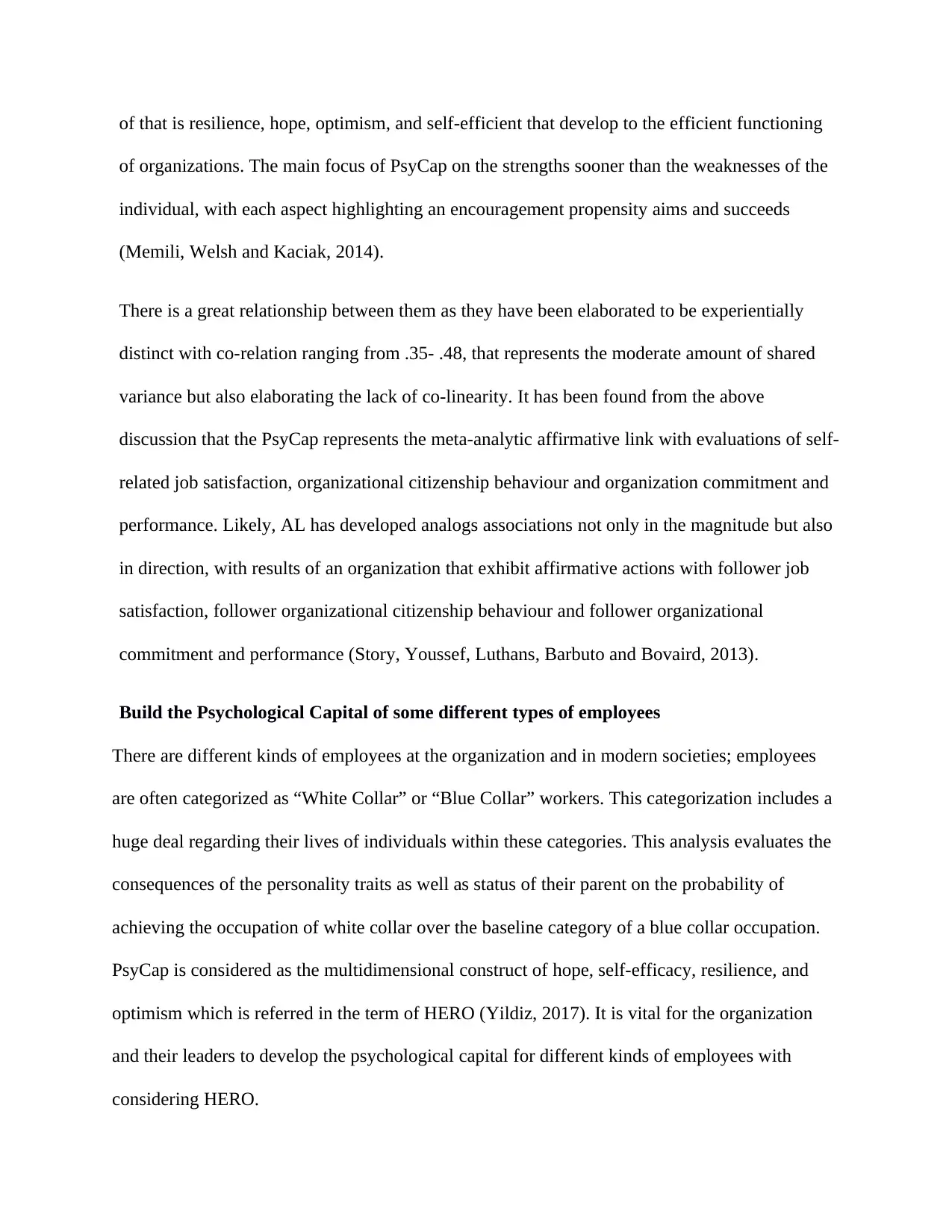
of that is resilience, hope, optimism, and self-efficient that develop to the efficient functioning
of organizations. The main focus of PsyCap on the strengths sooner than the weaknesses of the
individual, with each aspect highlighting an encouragement propensity aims and succeeds
(Memili, Welsh and Kaciak, 2014).
There is a great relationship between them as they have been elaborated to be experientially
distinct with co-relation ranging from .35- .48, that represents the moderate amount of shared
variance but also elaborating the lack of co-linearity. It has been found from the above
discussion that the PsyCap represents the meta-analytic affirmative link with evaluations of self-
related job satisfaction, organizational citizenship behaviour and organization commitment and
performance. Likely, AL has developed analogs associations not only in the magnitude but also
in direction, with results of an organization that exhibit affirmative actions with follower job
satisfaction, follower organizational citizenship behaviour and follower organizational
commitment and performance (Story, Youssef, Luthans, Barbuto and Bovaird, 2013).
Build the Psychological Capital of some different types of employees
There are different kinds of employees at the organization and in modern societies; employees
are often categorized as “White Collar” or “Blue Collar” workers. This categorization includes a
huge deal regarding their lives of individuals within these categories. This analysis evaluates the
consequences of the personality traits as well as status of their parent on the probability of
achieving the occupation of white collar over the baseline category of a blue collar occupation.
PsyCap is considered as the multidimensional construct of hope, self-efficacy, resilience, and
optimism which is referred in the term of HERO (Yildiz, 2017). It is vital for the organization
and their leaders to develop the psychological capital for different kinds of employees with
considering HERO.
of organizations. The main focus of PsyCap on the strengths sooner than the weaknesses of the
individual, with each aspect highlighting an encouragement propensity aims and succeeds
(Memili, Welsh and Kaciak, 2014).
There is a great relationship between them as they have been elaborated to be experientially
distinct with co-relation ranging from .35- .48, that represents the moderate amount of shared
variance but also elaborating the lack of co-linearity. It has been found from the above
discussion that the PsyCap represents the meta-analytic affirmative link with evaluations of self-
related job satisfaction, organizational citizenship behaviour and organization commitment and
performance. Likely, AL has developed analogs associations not only in the magnitude but also
in direction, with results of an organization that exhibit affirmative actions with follower job
satisfaction, follower organizational citizenship behaviour and follower organizational
commitment and performance (Story, Youssef, Luthans, Barbuto and Bovaird, 2013).
Build the Psychological Capital of some different types of employees
There are different kinds of employees at the organization and in modern societies; employees
are often categorized as “White Collar” or “Blue Collar” workers. This categorization includes a
huge deal regarding their lives of individuals within these categories. This analysis evaluates the
consequences of the personality traits as well as status of their parent on the probability of
achieving the occupation of white collar over the baseline category of a blue collar occupation.
PsyCap is considered as the multidimensional construct of hope, self-efficacy, resilience, and
optimism which is referred in the term of HERO (Yildiz, 2017). It is vital for the organization
and their leaders to develop the psychological capital for different kinds of employees with
considering HERO.
⊘ This is a preview!⊘
Do you want full access?
Subscribe today to unlock all pages.

Trusted by 1+ million students worldwide
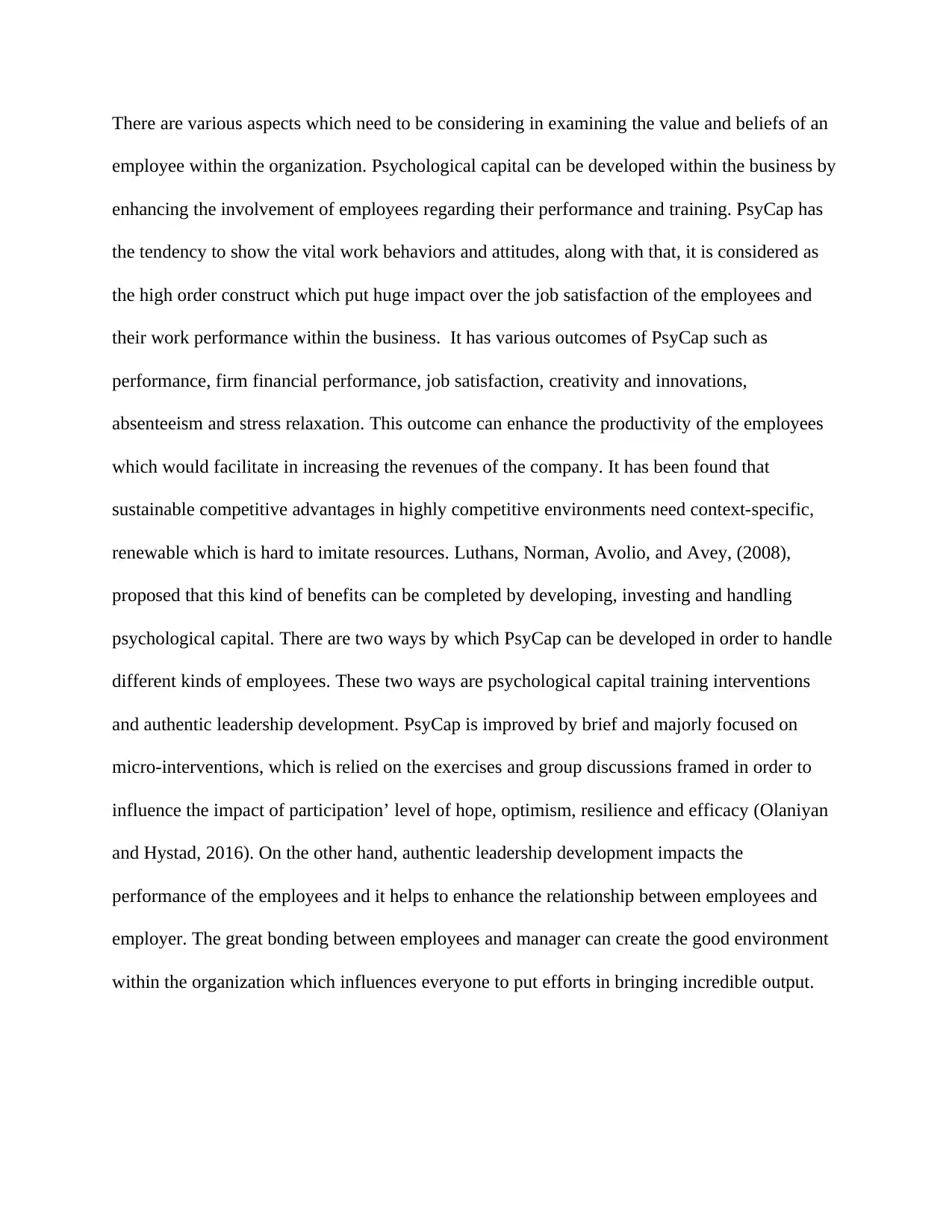
There are various aspects which need to be considering in examining the value and beliefs of an
employee within the organization. Psychological capital can be developed within the business by
enhancing the involvement of employees regarding their performance and training. PsyCap has
the tendency to show the vital work behaviors and attitudes, along with that, it is considered as
the high order construct which put huge impact over the job satisfaction of the employees and
their work performance within the business. It has various outcomes of PsyCap such as
performance, firm financial performance, job satisfaction, creativity and innovations,
absenteeism and stress relaxation. This outcome can enhance the productivity of the employees
which would facilitate in increasing the revenues of the company. It has been found that
sustainable competitive advantages in highly competitive environments need context-specific,
renewable which is hard to imitate resources. Luthans, Norman, Avolio, and Avey, (2008),
proposed that this kind of benefits can be completed by developing, investing and handling
psychological capital. There are two ways by which PsyCap can be developed in order to handle
different kinds of employees. These two ways are psychological capital training interventions
and authentic leadership development. PsyCap is improved by brief and majorly focused on
micro-interventions, which is relied on the exercises and group discussions framed in order to
influence the impact of participation’ level of hope, optimism, resilience and efficacy (Olaniyan
and Hystad, 2016). On the other hand, authentic leadership development impacts the
performance of the employees and it helps to enhance the relationship between employees and
employer. The great bonding between employees and manager can create the good environment
within the organization which influences everyone to put efforts in bringing incredible output.
employee within the organization. Psychological capital can be developed within the business by
enhancing the involvement of employees regarding their performance and training. PsyCap has
the tendency to show the vital work behaviors and attitudes, along with that, it is considered as
the high order construct which put huge impact over the job satisfaction of the employees and
their work performance within the business. It has various outcomes of PsyCap such as
performance, firm financial performance, job satisfaction, creativity and innovations,
absenteeism and stress relaxation. This outcome can enhance the productivity of the employees
which would facilitate in increasing the revenues of the company. It has been found that
sustainable competitive advantages in highly competitive environments need context-specific,
renewable which is hard to imitate resources. Luthans, Norman, Avolio, and Avey, (2008),
proposed that this kind of benefits can be completed by developing, investing and handling
psychological capital. There are two ways by which PsyCap can be developed in order to handle
different kinds of employees. These two ways are psychological capital training interventions
and authentic leadership development. PsyCap is improved by brief and majorly focused on
micro-interventions, which is relied on the exercises and group discussions framed in order to
influence the impact of participation’ level of hope, optimism, resilience and efficacy (Olaniyan
and Hystad, 2016). On the other hand, authentic leadership development impacts the
performance of the employees and it helps to enhance the relationship between employees and
employer. The great bonding between employees and manager can create the good environment
within the organization which influences everyone to put efforts in bringing incredible output.
Paraphrase This Document
Need a fresh take? Get an instant paraphrase of this document with our AI Paraphraser
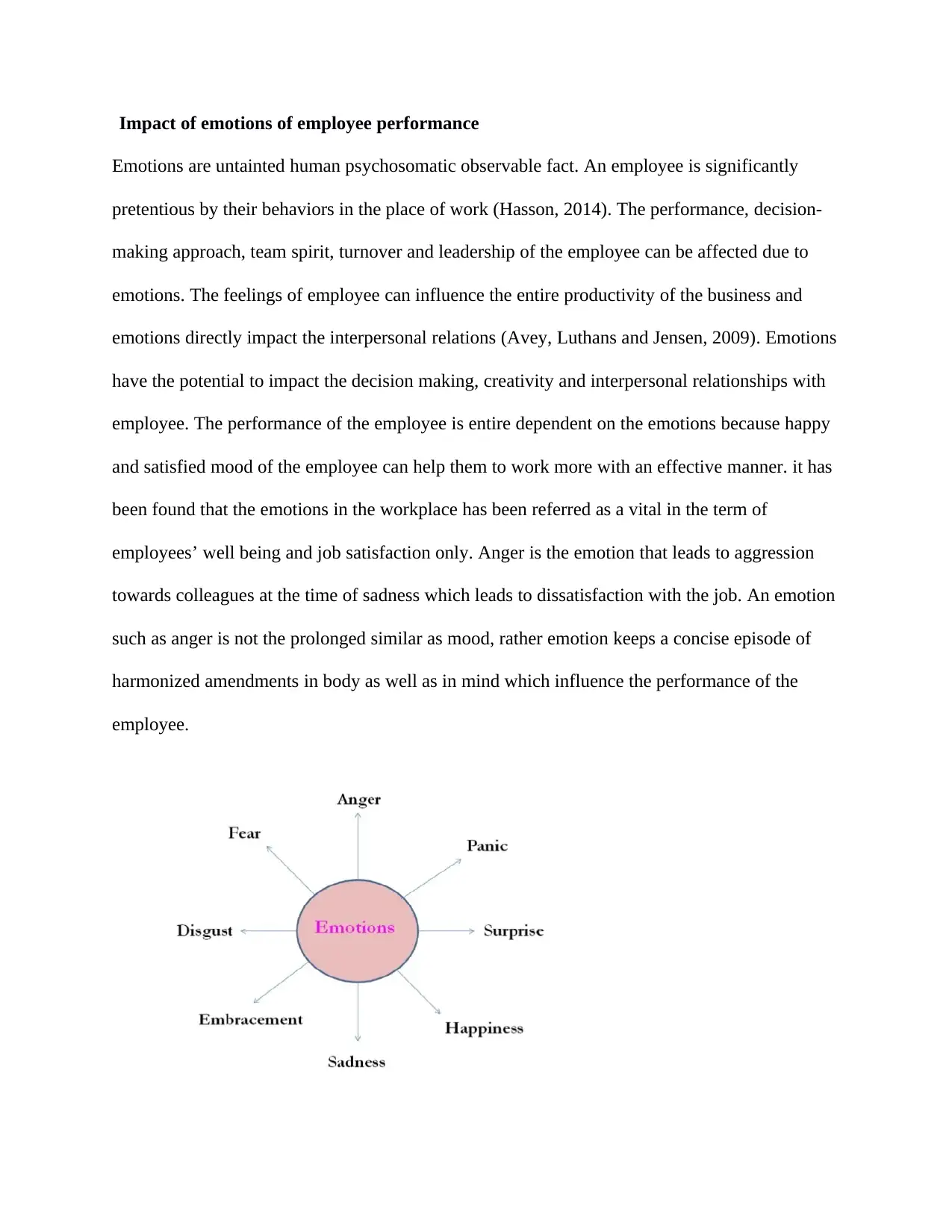
Impact of emotions of employee performance
Emotions are untainted human psychosomatic observable fact. An employee is significantly
pretentious by their behaviors in the place of work (Hasson, 2014). The performance, decision-
making approach, team spirit, turnover and leadership of the employee can be affected due to
emotions. The feelings of employee can influence the entire productivity of the business and
emotions directly impact the interpersonal relations (Avey, Luthans and Jensen, 2009). Emotions
have the potential to impact the decision making, creativity and interpersonal relationships with
employee. The performance of the employee is entire dependent on the emotions because happy
and satisfied mood of the employee can help them to work more with an effective manner. it has
been found that the emotions in the workplace has been referred as a vital in the term of
employees’ well being and job satisfaction only. Anger is the emotion that leads to aggression
towards colleagues at the time of sadness which leads to dissatisfaction with the job. An emotion
such as anger is not the prolonged similar as mood, rather emotion keeps a concise episode of
harmonized amendments in body as well as in mind which influence the performance of the
employee.
Emotions are untainted human psychosomatic observable fact. An employee is significantly
pretentious by their behaviors in the place of work (Hasson, 2014). The performance, decision-
making approach, team spirit, turnover and leadership of the employee can be affected due to
emotions. The feelings of employee can influence the entire productivity of the business and
emotions directly impact the interpersonal relations (Avey, Luthans and Jensen, 2009). Emotions
have the potential to impact the decision making, creativity and interpersonal relationships with
employee. The performance of the employee is entire dependent on the emotions because happy
and satisfied mood of the employee can help them to work more with an effective manner. it has
been found that the emotions in the workplace has been referred as a vital in the term of
employees’ well being and job satisfaction only. Anger is the emotion that leads to aggression
towards colleagues at the time of sadness which leads to dissatisfaction with the job. An emotion
such as anger is not the prolonged similar as mood, rather emotion keeps a concise episode of
harmonized amendments in body as well as in mind which influence the performance of the
employee.
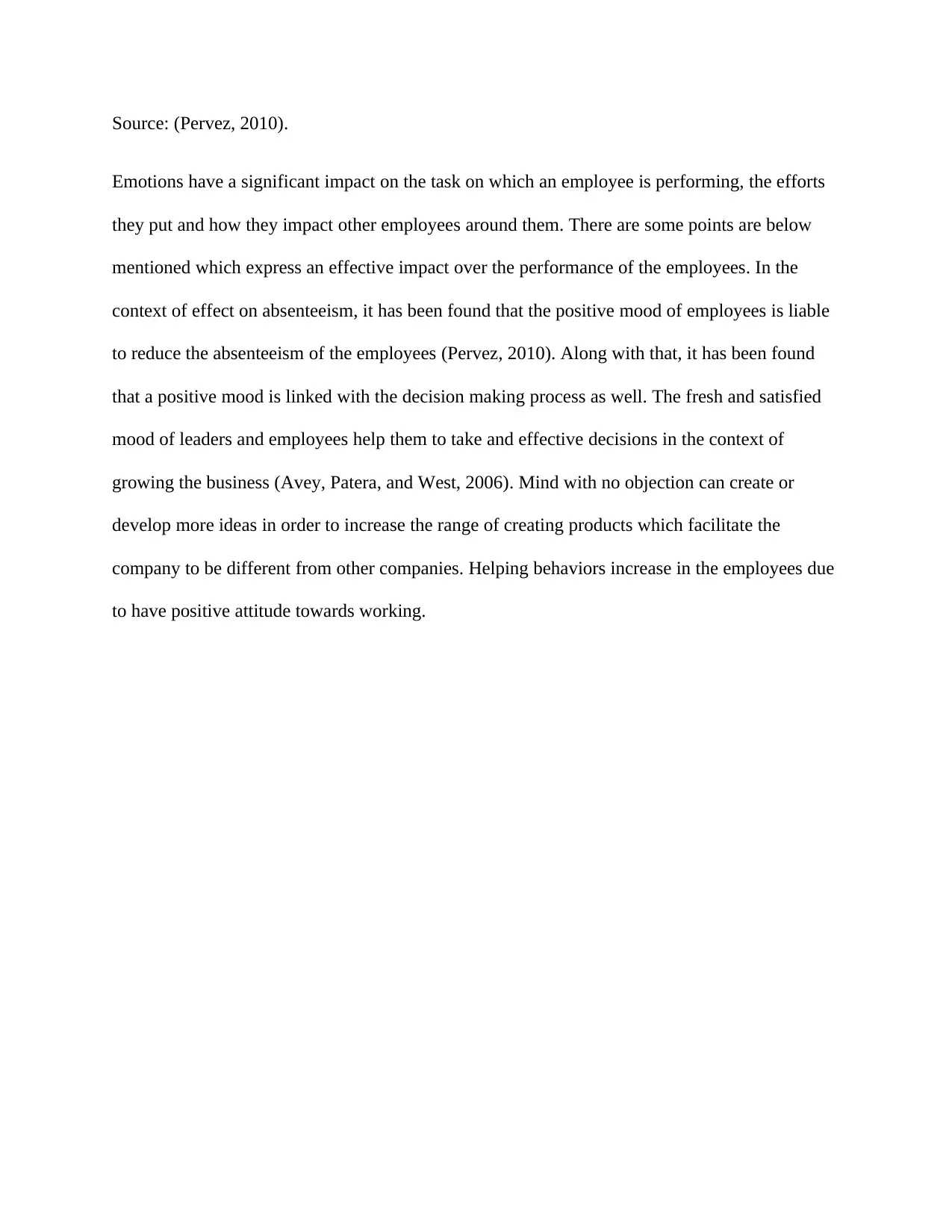
Source: (Pervez, 2010).
Emotions have a significant impact on the task on which an employee is performing, the efforts
they put and how they impact other employees around them. There are some points are below
mentioned which express an effective impact over the performance of the employees. In the
context of effect on absenteeism, it has been found that the positive mood of employees is liable
to reduce the absenteeism of the employees (Pervez, 2010). Along with that, it has been found
that a positive mood is linked with the decision making process as well. The fresh and satisfied
mood of leaders and employees help them to take and effective decisions in the context of
growing the business (Avey, Patera, and West, 2006). Mind with no objection can create or
develop more ideas in order to increase the range of creating products which facilitate the
company to be different from other companies. Helping behaviors increase in the employees due
to have positive attitude towards working.
Emotions have a significant impact on the task on which an employee is performing, the efforts
they put and how they impact other employees around them. There are some points are below
mentioned which express an effective impact over the performance of the employees. In the
context of effect on absenteeism, it has been found that the positive mood of employees is liable
to reduce the absenteeism of the employees (Pervez, 2010). Along with that, it has been found
that a positive mood is linked with the decision making process as well. The fresh and satisfied
mood of leaders and employees help them to take and effective decisions in the context of
growing the business (Avey, Patera, and West, 2006). Mind with no objection can create or
develop more ideas in order to increase the range of creating products which facilitate the
company to be different from other companies. Helping behaviors increase in the employees due
to have positive attitude towards working.
⊘ This is a preview!⊘
Do you want full access?
Subscribe today to unlock all pages.

Trusted by 1+ million students worldwide
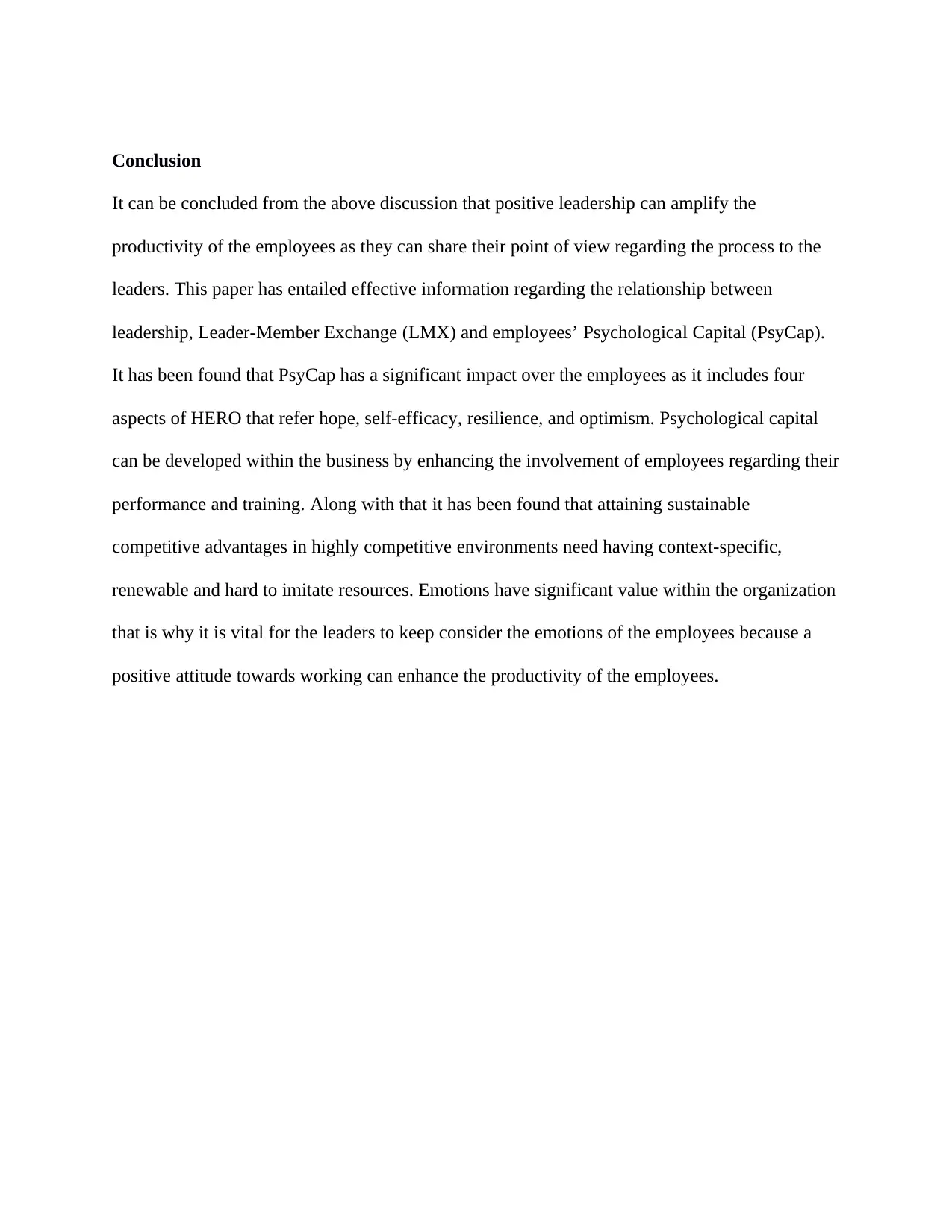
Conclusion
It can be concluded from the above discussion that positive leadership can amplify the
productivity of the employees as they can share their point of view regarding the process to the
leaders. This paper has entailed effective information regarding the relationship between
leadership, Leader-Member Exchange (LMX) and employees’ Psychological Capital (PsyCap).
It has been found that PsyCap has a significant impact over the employees as it includes four
aspects of HERO that refer hope, self-efficacy, resilience, and optimism. Psychological capital
can be developed within the business by enhancing the involvement of employees regarding their
performance and training. Along with that it has been found that attaining sustainable
competitive advantages in highly competitive environments need having context-specific,
renewable and hard to imitate resources. Emotions have significant value within the organization
that is why it is vital for the leaders to keep consider the emotions of the employees because a
positive attitude towards working can enhance the productivity of the employees.
It can be concluded from the above discussion that positive leadership can amplify the
productivity of the employees as they can share their point of view regarding the process to the
leaders. This paper has entailed effective information regarding the relationship between
leadership, Leader-Member Exchange (LMX) and employees’ Psychological Capital (PsyCap).
It has been found that PsyCap has a significant impact over the employees as it includes four
aspects of HERO that refer hope, self-efficacy, resilience, and optimism. Psychological capital
can be developed within the business by enhancing the involvement of employees regarding their
performance and training. Along with that it has been found that attaining sustainable
competitive advantages in highly competitive environments need having context-specific,
renewable and hard to imitate resources. Emotions have significant value within the organization
that is why it is vital for the leaders to keep consider the emotions of the employees because a
positive attitude towards working can enhance the productivity of the employees.
Paraphrase This Document
Need a fresh take? Get an instant paraphrase of this document with our AI Paraphraser
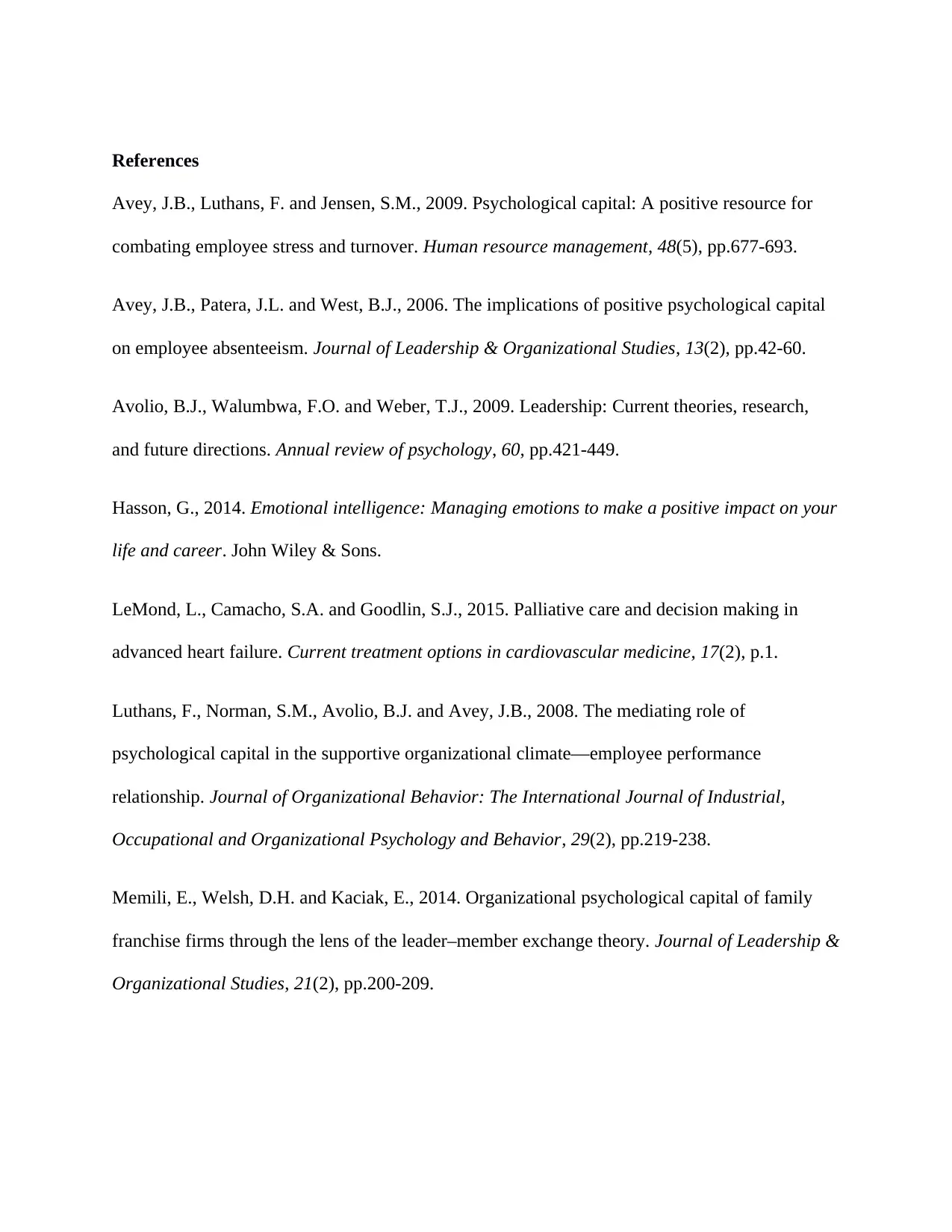
References
Avey, J.B., Luthans, F. and Jensen, S.M., 2009. Psychological capital: A positive resource for
combating employee stress and turnover. Human resource management, 48(5), pp.677-693.
Avey, J.B., Patera, J.L. and West, B.J., 2006. The implications of positive psychological capital
on employee absenteeism. Journal of Leadership & Organizational Studies, 13(2), pp.42-60.
Avolio, B.J., Walumbwa, F.O. and Weber, T.J., 2009. Leadership: Current theories, research,
and future directions. Annual review of psychology, 60, pp.421-449.
Hasson, G., 2014. Emotional intelligence: Managing emotions to make a positive impact on your
life and career. John Wiley & Sons.
LeMond, L., Camacho, S.A. and Goodlin, S.J., 2015. Palliative care and decision making in
advanced heart failure. Current treatment options in cardiovascular medicine, 17(2), p.1.
Luthans, F., Norman, S.M., Avolio, B.J. and Avey, J.B., 2008. The mediating role of
psychological capital in the supportive organizational climate—employee performance
relationship. Journal of Organizational Behavior: The International Journal of Industrial,
Occupational and Organizational Psychology and Behavior, 29(2), pp.219-238.
Memili, E., Welsh, D.H. and Kaciak, E., 2014. Organizational psychological capital of family
franchise firms through the lens of the leader–member exchange theory. Journal of Leadership &
Organizational Studies, 21(2), pp.200-209.
Avey, J.B., Luthans, F. and Jensen, S.M., 2009. Psychological capital: A positive resource for
combating employee stress and turnover. Human resource management, 48(5), pp.677-693.
Avey, J.B., Patera, J.L. and West, B.J., 2006. The implications of positive psychological capital
on employee absenteeism. Journal of Leadership & Organizational Studies, 13(2), pp.42-60.
Avolio, B.J., Walumbwa, F.O. and Weber, T.J., 2009. Leadership: Current theories, research,
and future directions. Annual review of psychology, 60, pp.421-449.
Hasson, G., 2014. Emotional intelligence: Managing emotions to make a positive impact on your
life and career. John Wiley & Sons.
LeMond, L., Camacho, S.A. and Goodlin, S.J., 2015. Palliative care and decision making in
advanced heart failure. Current treatment options in cardiovascular medicine, 17(2), p.1.
Luthans, F., Norman, S.M., Avolio, B.J. and Avey, J.B., 2008. The mediating role of
psychological capital in the supportive organizational climate—employee performance
relationship. Journal of Organizational Behavior: The International Journal of Industrial,
Occupational and Organizational Psychology and Behavior, 29(2), pp.219-238.
Memili, E., Welsh, D.H. and Kaciak, E., 2014. Organizational psychological capital of family
franchise firms through the lens of the leader–member exchange theory. Journal of Leadership &
Organizational Studies, 21(2), pp.200-209.
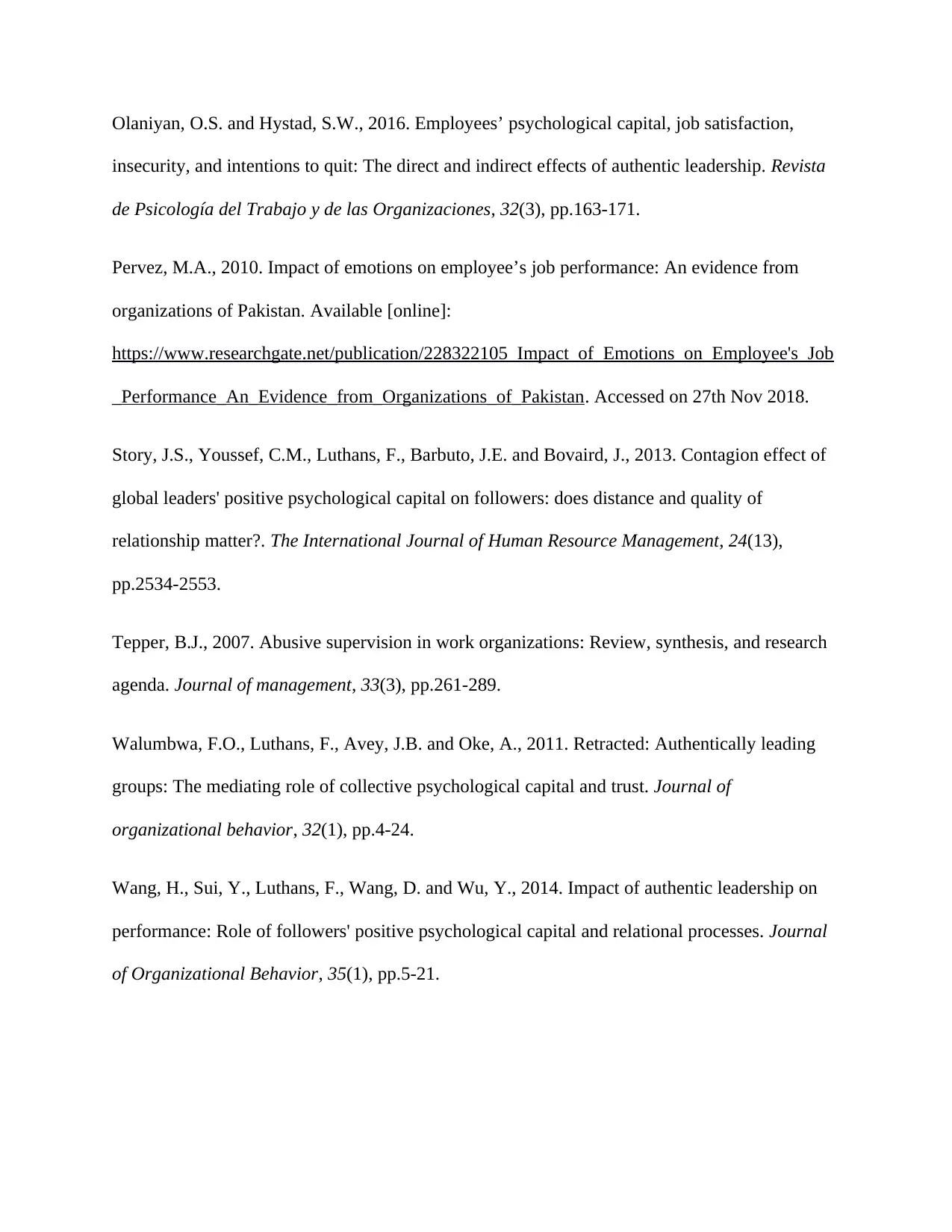
Olaniyan, O.S. and Hystad, S.W., 2016. Employees’ psychological capital, job satisfaction,
insecurity, and intentions to quit: The direct and indirect effects of authentic leadership. Revista
de Psicología del Trabajo y de las Organizaciones, 32(3), pp.163-171.
Pervez, M.A., 2010. Impact of emotions on employee’s job performance: An evidence from
organizations of Pakistan. Available [online]:
https://www.researchgate.net/publication/228322105_Impact_of_Emotions_on_Employee's_Job
_Performance_An_Evidence_from_Organizations_of_Pakistan. Accessed on 27th Nov 2018.
Story, J.S., Youssef, C.M., Luthans, F., Barbuto, J.E. and Bovaird, J., 2013. Contagion effect of
global leaders' positive psychological capital on followers: does distance and quality of
relationship matter?. The International Journal of Human Resource Management, 24(13),
pp.2534-2553.
Tepper, B.J., 2007. Abusive supervision in work organizations: Review, synthesis, and research
agenda. Journal of management, 33(3), pp.261-289.
Walumbwa, F.O., Luthans, F., Avey, J.B. and Oke, A., 2011. Retracted: Authentically leading
groups: The mediating role of collective psychological capital and trust. Journal of
organizational behavior, 32(1), pp.4-24.
Wang, H., Sui, Y., Luthans, F., Wang, D. and Wu, Y., 2014. Impact of authentic leadership on
performance: Role of followers' positive psychological capital and relational processes. Journal
of Organizational Behavior, 35(1), pp.5-21.
insecurity, and intentions to quit: The direct and indirect effects of authentic leadership. Revista
de Psicología del Trabajo y de las Organizaciones, 32(3), pp.163-171.
Pervez, M.A., 2010. Impact of emotions on employee’s job performance: An evidence from
organizations of Pakistan. Available [online]:
https://www.researchgate.net/publication/228322105_Impact_of_Emotions_on_Employee's_Job
_Performance_An_Evidence_from_Organizations_of_Pakistan. Accessed on 27th Nov 2018.
Story, J.S., Youssef, C.M., Luthans, F., Barbuto, J.E. and Bovaird, J., 2013. Contagion effect of
global leaders' positive psychological capital on followers: does distance and quality of
relationship matter?. The International Journal of Human Resource Management, 24(13),
pp.2534-2553.
Tepper, B.J., 2007. Abusive supervision in work organizations: Review, synthesis, and research
agenda. Journal of management, 33(3), pp.261-289.
Walumbwa, F.O., Luthans, F., Avey, J.B. and Oke, A., 2011. Retracted: Authentically leading
groups: The mediating role of collective psychological capital and trust. Journal of
organizational behavior, 32(1), pp.4-24.
Wang, H., Sui, Y., Luthans, F., Wang, D. and Wu, Y., 2014. Impact of authentic leadership on
performance: Role of followers' positive psychological capital and relational processes. Journal
of Organizational Behavior, 35(1), pp.5-21.
⊘ This is a preview!⊘
Do you want full access?
Subscribe today to unlock all pages.

Trusted by 1+ million students worldwide
1 out of 13
Related Documents
Your All-in-One AI-Powered Toolkit for Academic Success.
+13062052269
info@desklib.com
Available 24*7 on WhatsApp / Email
![[object Object]](/_next/static/media/star-bottom.7253800d.svg)
Unlock your academic potential
Copyright © 2020–2026 A2Z Services. All Rights Reserved. Developed and managed by ZUCOL.



